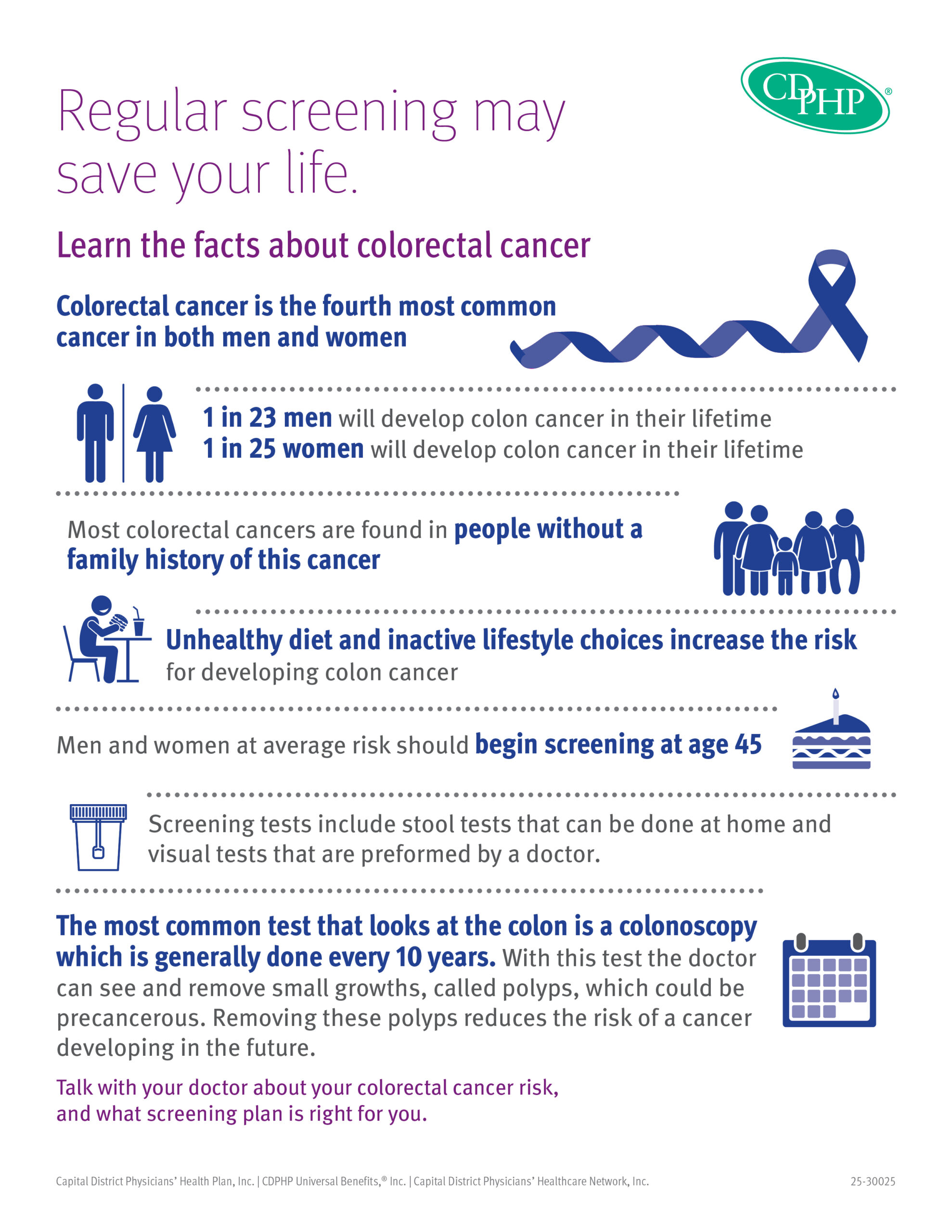Fact or Fiction: Colorectal Cancer

Cancer can be a difficult subject to discuss, and no form of cancer causes more conversational discomfort than colorectal cancer – largely because the screening is often viewed as invasive, uncomfortable, and too overwhelming to consider.
Misconceptions about screenings are one of many colorectal cancer myths that discourage people from following testing guidelines. The American Cancer Society (ACS) recommends that adults ages 45 and older be regularly screened for colorectal cancer. Yet, one in three Americans – about 23 million – don’t follow the recommendation.
Take a look at the common colorectal cancer myths and facts below and talk to your doctor about getting the life-saving screening tests you need, when you need them.
FICTION: A colonoscopy is the only screening available for colorectal cancer.
FACT: While colorectal cancer can be uncomfortable to talk about, testing doesn’t have to be. There are several screening tests available, including some that are non-invasive and can even be done at home. The American Cancer Society recommends that patients periodically receive one of several colon cancer screening tests, including, but not limited to:
- Fecal Occult Blood Test (FOBT) or Fecal Immunochemical Test (FIT): This test checks for blood in your stool and is performed in the privacy of your home. If blood is found, a colonoscopy may be recommended.
- Stool DNA Test (Cologuard): This test checks for DNA changes that could indicate cancer or polyps, and also checks for the presence of blood in the stool that can indicate cancer.
- Colonoscopy: During the exam, your doctor checks your entire colon (large bowel). A colonoscopy can prevent cancer from developing because it allows your doctor to remove polyps.
Which colon cancer screening is right for you?
Talk to your doctor about which test is right for you. Feel free to refer to the chart below for more information on each test, where it is done, required preparation, and how often the test is recommended.
| Colorectal Cancer Screen | Test Can Be Done at Home | Preparation Required | Special Diet Required | How Often* |
| Fecal Occult Blood Test | Yes | No | Yes | Annual |
| Fecal Immunochemical Test (FIT) | Yes | No | No | Annual |
| Cologuard® | Yes | No | No | Every 3 years |
| Colonoscopy | No | Yes | Yes | Every 10 years |
*Or as recommended by your doctor.
Fact or Fiction?
FICTION: Colorectal cancer is a man’s disease.
FACT: Colorectal cancer is almost as common among women as men. Each year in the U.S., about 82,000 men and 71,000 women are diagnosed with colorectal cancer according to the American Cancer Society.
FICTION: Colorectal cancer cannot be prevented.
FACT: In many cases, colorectal cancer can be prevented. Colorectal cancer almost always starts with a small growth called a polyp. If the polyp is found early, it can be removed – stopping colorectal cancer before it starts. Consider these steps to reduce your risk for colorectal cancer: Maintain a healthy weight throughout life. Be physically active. Limit the amount of alcohol you drink. Eat more fruits, vegetables, and whole grains and less red or processed meat. Don’t use tobacco in any form.
FICTION: African Americans are not at risk for colorectal cancer.
FACT: African American men and women are diagnosed with and die from colorectal cancer at higher rates than men and women of any other U.S. racial or ethnic group.
FICTION: Age doesn’t matter when it comes to colorectal cancer.
FACT: Most colorectal cancers are found in people age 45 and older. As stated earlier, the ACS recommends that you start getting tested at age 45. People who are at a higher risk for colorectal cancer—such as those who have colon or rectal cancer in their families—may need to begin testing at a younger age. Talk to your doctor about when you should be tested.
FICTION: There’s no point getting tested for colorectal cancer because it’s deadly anyway.
FACT: Colorectal cancer is often highly treatable. If it’s found and treated early (while it’s small and before it has spread), the five-year survival rate is about 90 percent. But because many people are not getting tested, only about four out of 10 are diagnosed at this early stage when treatment is most likely to be successful. Talk with your doctor about colorectal cancer screenings, or call us at 1-888-94-CDPHP (23747) to learn more about resources available to you.
 The Daily Dose
The Daily Dose
John wojcik
Polyp s take only five years to turn cancerous, so why colonoscopy only every ten?
Renee Golderman
Colon cancer screening should begin at age 45 for most people. If a colonoscopy doesn’t find adenomas or cancer and you don’t have risk factors, the next test should be in ten years. If one or two small, low-risk adenomas are removed, the exam should be repeated in five to ten years. Since these are general guidelines, all members should check with their individual doctor for the best advice regarding how often to have a colonoscopy. For additional information check out this link:
http://www.choosingwisely.org/patient-resources/colonoscopy/
robin zucker
Last year I did cologuard test which was neg.according to your post above its good for 3 years,so why is my doctor making me do a colonoscopy now?
Renee Golderman
Hi Robin – thanks for taking the time to comment. Your best bet is to discuss your concerns with your doctor since he/she knows your comprehensive medical history. Thank you!